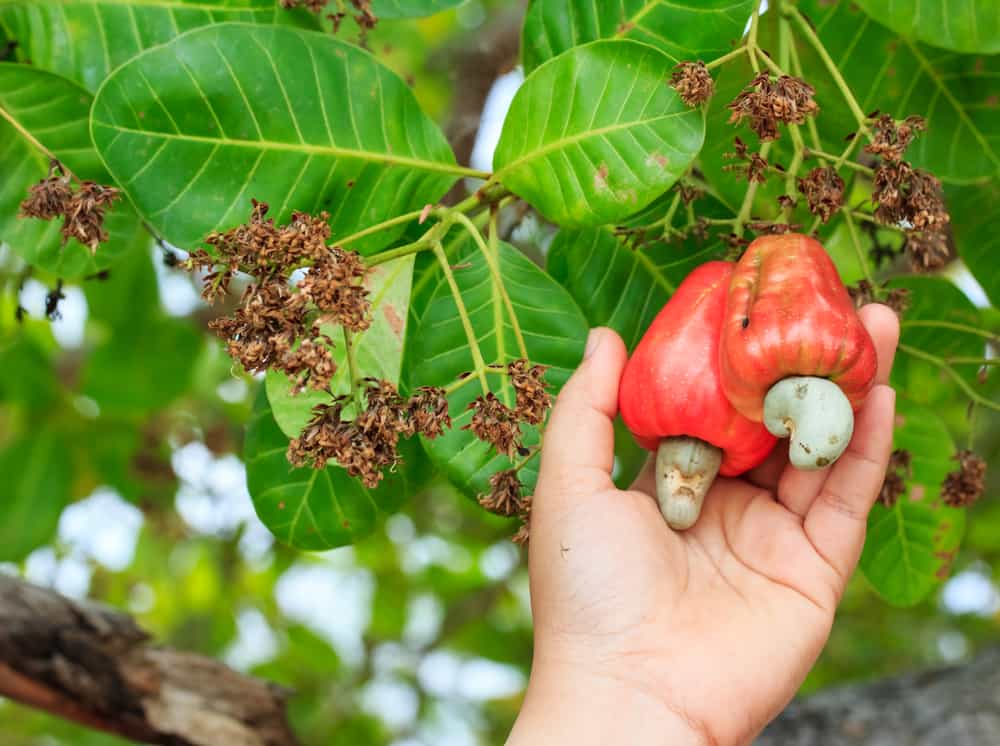
It’s a funny thing how certain items can become such staples in our lives, but we have no idea the journey these items take to get into our homes. This is increasingly common with foods, like raw cashews, that actually grow on other continents but make their way through a long, arduous process to our kitchens and tables. Foods like raw cashews have a rich history, but the reality of the supply chain reveals that there’s much to be done to make the cashew industry better.
The cashew tree originated in Brazil, but the modern cashew industry got its roots from Portuguese sailors who brought cashew trees to India in the 16th century. Cashew trees have extensive root and branch systems, which helped them become bountiful around India’s coastal region. Hungry elephants were actually responsible for the cashew nut’s propagation around India; After elephants would eat the cashew seeds, they’d disperse seeds through their droppings as they moved across the country.
Raw cashews began their journey to being a commercial export around 400 years after Portugues brought them to India. Now, they are one of the most valuable nuts on the commodity market, with a value of $6.27 billion US dollars.
The first thing many people don’t realize about cashews is they are technically a seed, not a nut. This is because they form out of something called a cashew apple, which is a large swollen stem that looks similar to an apple you would think of today. Out of that stem grows a single cashew.
Cashew apples and cashew nuts typically form in the winter or a dry season. About two months after the fruit has set, the apple will take on a pink or red hue, and the nut will turn gray, signaling they are ready to be picked. Many people will also wait for the apple to fall to the ground to ensure it is ripe. The nut can then be twisted to separate them from the apple. The apples themselves are edible, though they are extremely perishable, so they usually must be eaten locally and immediately. However, the nut can be stored in a cool and dry place for up to two years.
The last 20 years have seen a huge jump in cashew demand and production, and African countries have produced about two-thirds of the growth that has occurred over this time. But typically, cashews grown in African countries are exported for processing to India or Vietnam, the other two major cashew growers and processors in the world.
As we mentioned, after cashews are harvested, they must be carefully treated and processed to remove the nut from the casing. This process is delicate because cashew shells contain a toxin that can cause damage to the skin, resulting in burns and rashes. Because of the meticulous nature of raw cashew processing, this part of the supply chain is often exported to other countries. India and Vietnam account for nearly 98% of cashew processing. And once these countries have processed these nuts, they are shipped once again to consuming countries that often roast, chop, or prepare the nuts in other ways.
The tropical climate in many African countries provides the perfect environment for cashews to grow. But less than 15% of the worldwide production of cashews are deshelled in Africa. The value added later on in the supply chain can be 8 to 10 times more than the price paid to African farmers for raw, unshelled cashews.
For countries like the Ivory Coast and Benin, this means that the opportunity for value creation could go far by ways of job creation and higher wages. The additional income in these African countries, many of which are still classified as “developing,” would be incredibly valuable.
Keeping the shelling, processing, roasting, and packaging of bulk cashews in the producing countries gives producing countries higher revenue in one of the most stable and profitable industries in Africa already. This additional income will keep good jobs in Africa, as well as reducing poverty within the country and region.
Beyond the Nut’s holistic approach to ethical, sustainable bulk cashew production starts with the farmer and ends with the consumer, but we also recognize and support all the partners in between that make this supply chain possible.
This holistic approach brings positive change and impact to the surrounding families and businesses in cashew-producing communities. Through Beyond the Nut’s non-profit, Projects for Progress, Beyond the Nut is educating and empowering women and children to move and think beyond their current circumstances to a future of hope and prosperity.
Fuel Your Beyond with the Latest Discounts, Promotions, and Product Announcements
Free shipping on all U.S. orders over $25! Dismiss